The hair may be thinning, but the metal remains the
same.
The Spandex Nation Returns
By Lorraine All
GET READY FOR Predator, American Hardcore, Belly to belly and Generation
Swine. No, they're not monster truck races or the newest, bloodiest Kombat
video games. These apocalyptic names belong to new albums by former hair-metal
heroes Accept, L.A. Guns, Warrant and Motley Crue, respectively. If you
thought these onetime MTV gods and rulers of the Aqua Net kingdom went the way
of the aerosol spray can, think again. Hair metal is back with a vengeance -
the Crue's Generation Swine, in fact, entered Billboard's Top 200 at No.4.
And there's more . . Great White, Queensryche, Night Ranger and Enuff
Z'Nuff have all put out new albums in the past year; former screamers
Jon Bon Jovi and Kip Winger have released adult-oriented solo albums; WASP
and Ratt are on tour this summer; and rumors are circulating that Poison are
planning to reunite and that even AxI Rose is working on a new album, with or
without his fellow Guns n' Roses band mates.
"Bands are trying to rekindle the old fire," says Chip Z'Nuff, bassist
and founder of Enuff Z'Nuff, whose band hit big in 1989 with the song "Fly
High Michelle" and is one of the few hair-metal bands that has continued to
tour and put out albums throughout the '90's.
"There is an audience out there, so why not play? Everybody wants to go
back to where they were before. Also, labels are saying there is still
an audience out there for this group. You get a chance to trip your trigger
for the second time."
Whether the bands continued to put out albums in the days after
Nirvana's Nevermind sounded the death knell for pretty-boy glam in 1992, or have
only just decided that it's safe to get back in the water again, they all
face the daunting task of re-entering a music scene that exiled them with the
same disgust that France ousted Napoleon. Some bands that found fame in that
era are even rejecting it - Motley Crue refused to be interviewed for this
article for fear of being remembered as simply an '80´s metal band,
according to their publicist.
 motley fuckin crue
motley fuckin crue
"The No. I reason that bands are taking a second shot at things is
because it's become a little less fashionable to hate us," says Jani Lane,
singer of Warrant, a band that rivaled Three's Company in the sexual-innuendo
department with pop-rock hits like "Cherry Pie." "You can only bash an
entire decade of music for so long before it gets old."
Aside from the Crue's presence, the current Billboard charts are not
exactly busting with wielders of the Flying V guitar, but there has
been a definite reigniting of the hair- metal flame. MTV's It Came From the
'80´s II, an intensive documentary focusing on the past and present lives of
bands like Poison and Motley Crue, was one of the network's most popular shows
last year.
In Louisville, Ky.,radio station WTFX produced its Hair Band Weekend as
a one-off promotional gimmick for a Warrant show, in 1996, and now it's a
station staple. "We were flooded with calls," says WTFX operations
manager Michael Lee, whose station reaches more than a quarter-million listeners.
"The
phones just rang off the wall. Now it's a regular weekend show and the most
popular feature show we do. People love this stuff."
Hair metal is still shunned by hipsters on the East and West coasts, but
the movement is taking hold in Middle America and spreading outward.
"Fans are coming out of the closet," says Kip Winger, singer and bassist of
the late-'80´s blockbusters Winger. "They're not afraid to admit that they like this
kind of music."
There are many reasons for the resurgence. Biggest of all, perhaps, is
the nostalgic "I kinda miss spandex" factor Like New Wave, big- hair metal
is resurfacing as a new form of classic rock, inspiring bands to relive the
good old days. "Kiss kicked a lot of this stuff off," says WTFX's Lee.
"Though Kiss are not a hair band, I think people saw there
were major bucks to
be made. Everybody'll now be looking for their former lead singers, throwing the
band together with a Soundgarden-style haircut and hoping they all haven't gained 30
pounds."
 motley crue live
motley crue live
"It's funny, here we are; the alternative to alternative"
The weirdest phenomenon of all in the return of hair metal is the
indie-rock angle. Ten years ago, metal was the mainstay of major labels
and commercial radio while alternative rock was primarily put out on indie
labels for college-radio listeners. Today the roles have reversed.
"Since it's still uncool to be a radio director and say, 'I Like Warrant!'
we're getting played tons on college radio," says Lane.
'It's funny, says Warrant's frontman Jani Lane: "Here we are; the
alternative to alternative" " I would say at college radio stations has
quipled. Most big-hair metal bands were dumped from major labels in the early
'90´s. To continue recording they were forced to start over at a grassroots
level. "At a small label you can actually call up and talk to the president,"
says Lane who like most other ex-tongue waggers harbors a deep distrust of major
labels these days. "[An indie label] signed the band 'cause it liked the band
and it gives you creative freedom to just go away and do your thing. There was no such
thing when '80´s metal started."New York independent label Mayhem is one
leading force on the metal scene, with a roster that includes Enuff Z'Nuff, Dio
and Accept.
Another indie label CMC boasts Warrant, L.A. Guns and Slaughter and has
become so successful that it sold half of the company to powerhouse
BMG, in 1996. Tom Lipsky founded CMC five years ago on the premise that fans
were ready for the return of their favorite mainstream rock acts. Now it's
one of fastest growing indie labels in America. "One frequent question
people put to me is: 'Why do you think you can be successful?' " says Lipsky whose
North
Carolina- based label also features veteran rockers Pat Benatar and Lynyrd Skynyrd.
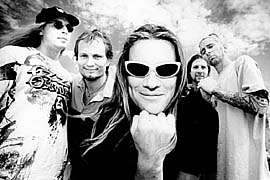 ugly kid joe
ugly kid joe
"People ask, 'How many [hair metal] bands are in the Top 200 right
now?' But all you need is one single to break, and they're on top again.
That's all you need."
Adds Tom Keifer, guitarist for Cinderella, who sold more than 10 million
albums between 1985 and 1991, and is considering a possible reunion: "I
don't think that all of a sudden, millions of people stopped liking hard
rock. I think they just stopped being served it. I know trends come and go, and things
change, but that was so abrupt. You're told no one wants to hear your music
anymore. It was like, 'Sorry, you're not cool anymore. Bye.'."
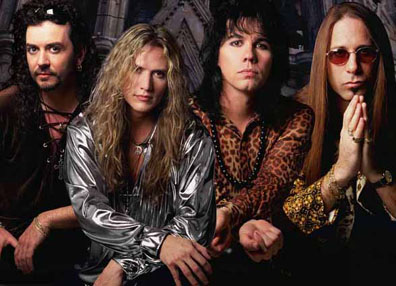 slaughter
slaughter
Warrant's Lane remembers the moment when he realized his status as a
rock god had crumbled. "I'd make a trip to New York every year to see Donny
Inner, president of Columbia," he says, "and the first time, there was a
poster of [the Warrant album Dirty Rotten Filthy Stinking Rich over his
secretary's desk, then, the next year, Cherry Pie. But I remember walking into his
office in '92, and there was an Alice in Chains poster, and I was like,
'Uh-oh, wasn't that the band who just opened for us?'"
"I don't think that all of a sudden, millions of people stopped liking
hard rock. I think they just stopped being served it."
Though rock fans are historically disloyal - Elvis Presley was dethroned
for the Beatles, and, later, Donna Summer for the Sex Pistols - the
shift from hair metal to grunge may have been the most abrupt mutiny in pop
history. "MTV pumped the world full of the kind of music we were
making, and it became even more fluffy and ludicrous because the scene got so damn
saturated," says Ronnie James Dio, leader of the band Dio, ex-singer of Black Sabbath
and
Rainbow, and proud father of a new Dio album out last year. "It's like,
finally, people just had enough of it cause something fresh had come in:
the punk scene."
The ridiculous image of Sunset Strip Spandroid culture still haunts the
pop psyche in the same way a supermodel is haunted by her gawky junior high
class photo. There were so many bad videos, bad outfits, bad hairdos
and, oh, yeah, so much bad music, that pop-rock bands like Enuff ´Znuff whose
music didn't even necessarily fit into the scene - still have to overcome an image that
they only momentarily and begrudgingly adopted. "At that time, MTV was only
playing big-haired bands, and we just wanted to get accepted in the scene," says
Chip Z'Nuff. "People were listening with their eyes instead of their
ears. In hindsight, if we didn't dress like that, we might never have been known
at all... or we might be U2 right now. I just don't know."
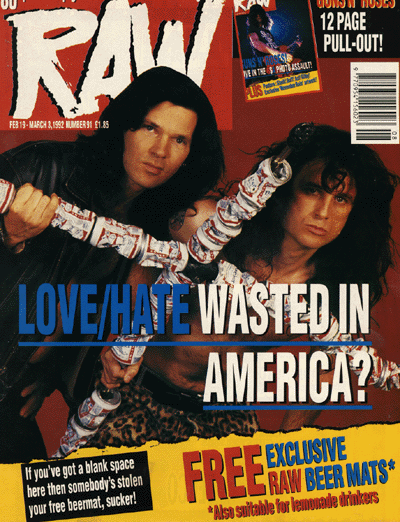 llove/hate
llove/hate
Many former hair boys are trying to overcome fashion travesties of the
past by concentrating onthe music this time. But the bands are taking no
shared approach to assimilate in the late '90´s, and there's not a sense that
they want to be part of some sort of united resurrection. Motley Crue and L.A. Guns have
adopted a rawer, grungier sound Kip Winger is reinventing himself as an
acoustic artist. And Warrant are basically playing the same way but with somewhat
smarter lyrics granted, there was nowhere to go but up. Some artists see
their peers' incorporation of new styles as a cop-out. "Bands have an obligation to
play the music their fans bought in the past," says Chip Z'Nuff. "It's silly
to hide from your past. I mean, you can't totally forget what happened. If you do,
you're questioning your fans' integrity."
"It's like, 'We're gonna dress up again, 'cause we´re sick of you
flannel guys."
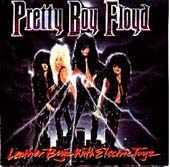 pretty boy floyd cult La Glam
pretty boy floyd cult La Glam
And fans do have integrity. They are turning away from the overcrowded
world of alternative rock and have not yet responded in a major way to
the hype surrounding electronic. There is a void in rock that needs to be
filled. "It sounds so cliche' to say that hard rock is about rebellion, but it
is," says Lane. "It's like, 'Screw you; we're gonna see what's big now and
go the complete opposite way!' It's like, 'Now we're gonna dress up again, 'cause we're
sick of you flannel guys.'"
Though there's not a preponderance of baby bands playing hair metal,
there is metallike showmanship in the music of bands like Marilyn Manson and
Psychotica, and that may be an indicator of where guitar rock is headed.
"[Motley Crue are] not gonna be the new thing," says Winger. "People
will be going to Motley Crue shows for nostalgic reasons. But to me, it's
futile, because they were best when they did Doctor Feelgood. That time was
really fun, and you can't bring that back".
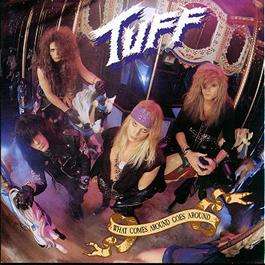
TuFF last band of an era. Altough 1998 is full of
promises not much glam bands are signed with major labels.
"I think, today, we're still an a front edge of a turn, though the
business is not totally lucrative yet," says CMC's Lipsky. "I think the smart
labels are building blocks now, thinking that six to 18 months from now,
straight-ahead mainstream rock & roll is going to again drive the
business like it does every five to seven years. Cycle in, cycle out - it always returns
to straight ahead rock & roll".
Copyright by ROLLING STONE MAGAZINE http://www.rollingstone.com
All Rights Reserved
 motley fuckin crue
motley fuckin crue motley crue live
motley crue live ugly kid joe
ugly kid joe llove/hate
llove/hate pretty boy floyd cult La Glam
pretty boy floyd cult La Glam